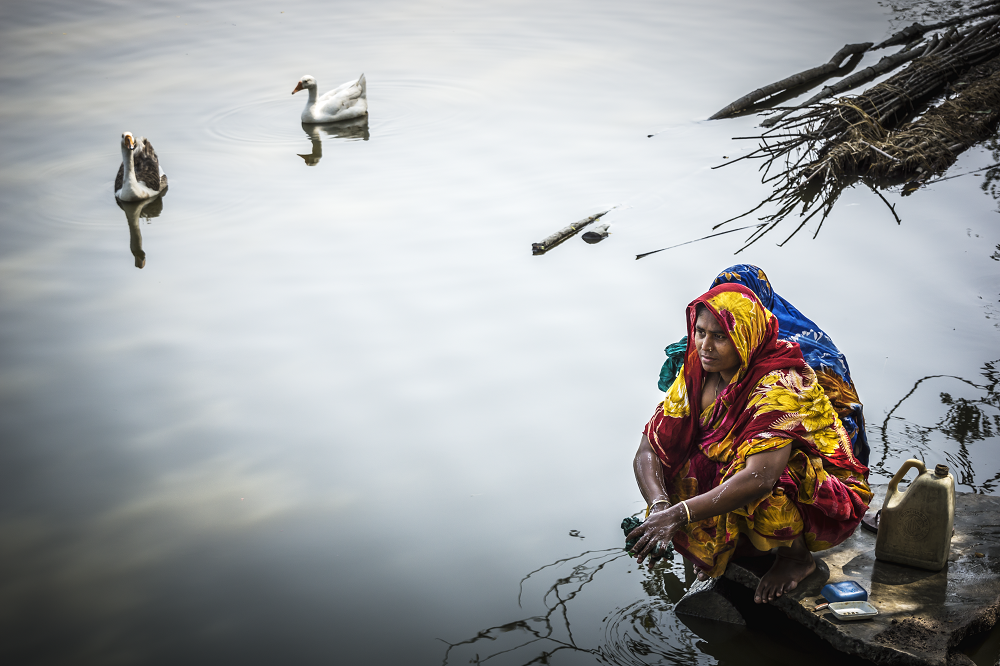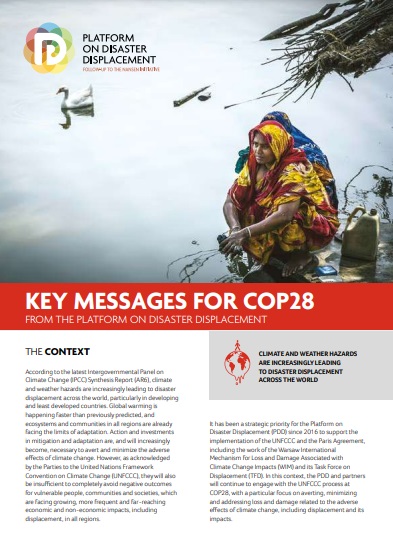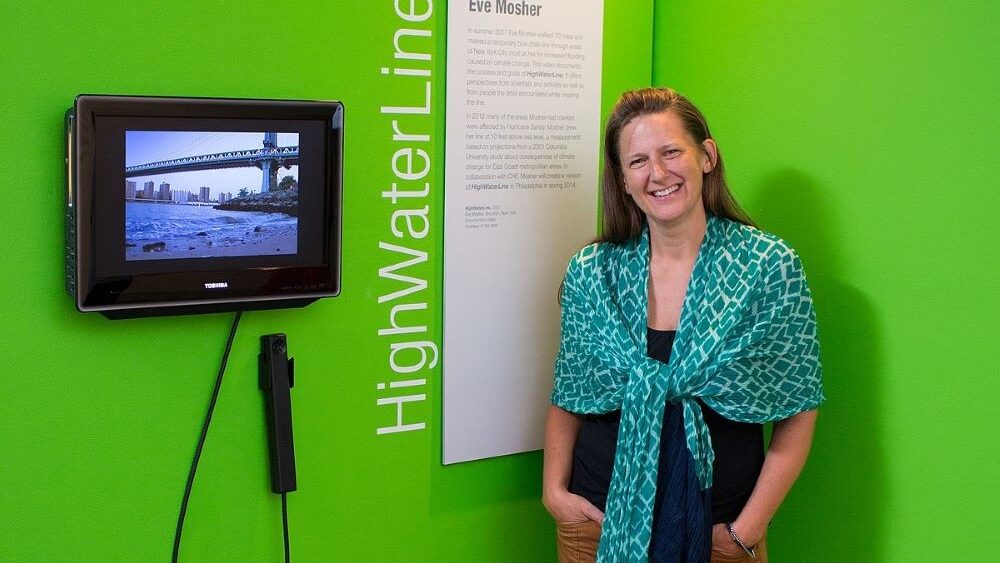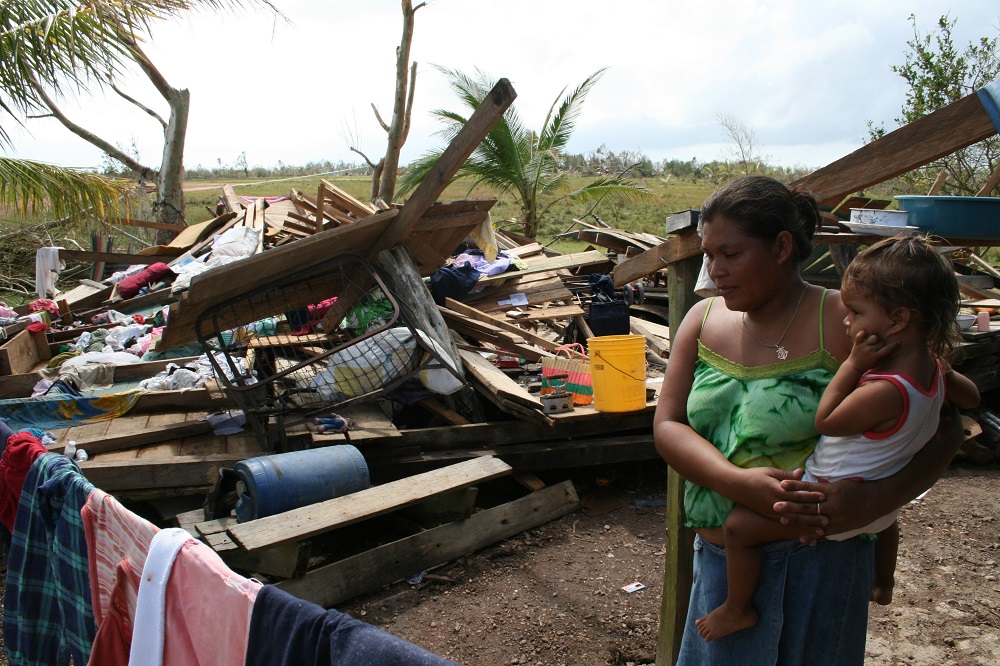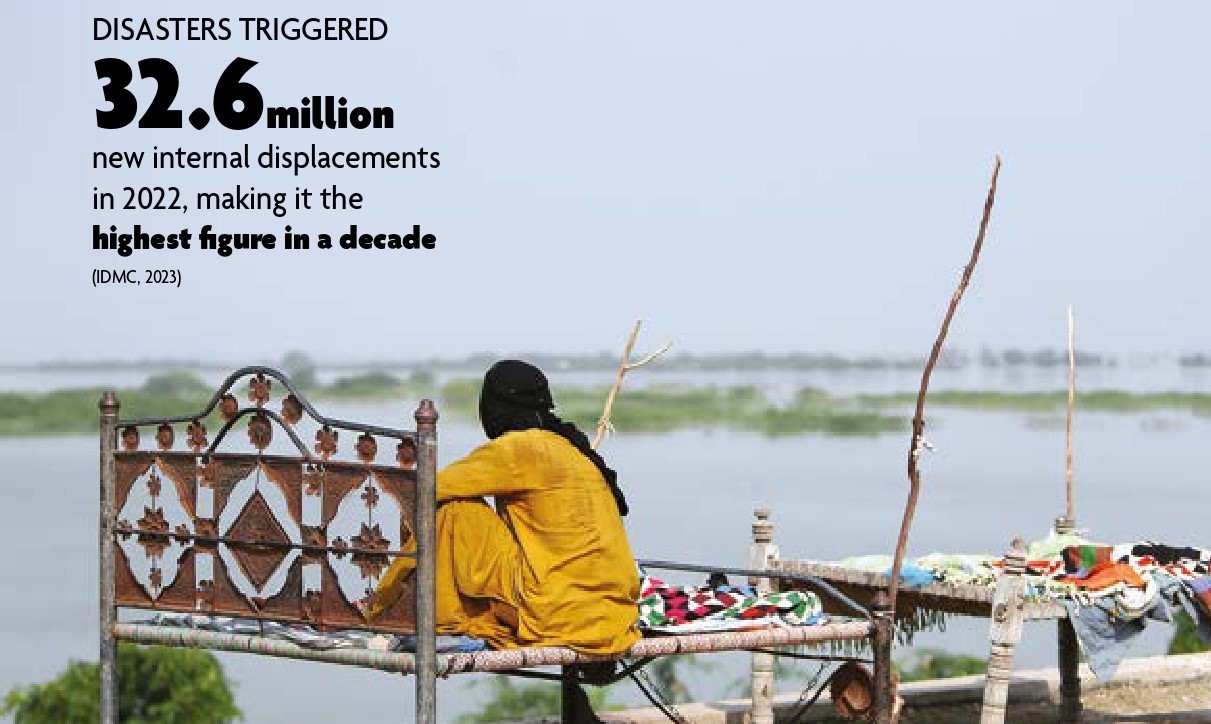
Key Messages for COP28
From the Platform on Disaster Displacement
on the Occasion of the 2023 United Nations Climate Change Conference
THE CONTEXT
According to the latest Intergovernmental Panel on Climate Change (IPCC) Synthesis Report (AR6), climate and weather hazards are increasingly leading to disaster displacement across the world, particularly in developing and least developed countries. Global warming is happening faster than previously predicted, and ecosystems and communities in all regions are already facing the limits of adaptation. Action and investments in mitigation and adaptation are, and will increasingly become, necessary to avert and minimize the adverse effects of climate change. However, as acknowledged by the Parties to the United Nations Framework Convention on Climate Change (UNFCCC), they will also be insufficient to completely avoid negative outcomes for vulnerable people, communities and societies, which are facing growing, more frequent and far-reaching economic and non-economic impacts, including displacement, in all regions.
It has been a strategic priority for the Platform on Disaster Displacement (PDD) since 2016 to support the implementation of the UNFCCC and the Paris Agreement, including the work of the Warsaw International Mechanism for Loss and Damage Associated with Climate Change Impacts (WIM) and its Task Force on Displacement (TFD). In this context, the PDD and partners will continue to engage with the UNFCCC process at COP28, with a particular focus on averting, minimizing and addressing loss and damage, including displacement, related to the adverse effects of climate change.
LOSS AND DAMAGE AND DISPLACEMENT
- Displacement is an indicator of economic and non-economic loss and damage that individuals and communities are suffering. Displacement is generally an outcome of last resort for people facing intolerable levels of risk, who cannot cope with hazards while remaining where they are, or when their ecosystems are becoming uninhabitable.
- Displacement is a damage or loss in itself, linked with people being forced to leave their homes and communities, thereby depriving them of their right to choose where and how to live.
- Displacement is also a driver of loss and damage. As stated by the IPCC, displacement generates and perpetuates vulnerability in natural and human systems in the context of climate change.
Work on disaster displacement and human mobility should be included and mainstreamed into all climate change policy works streams and in all climate change action efforts. Displacement bears a specific relevance to loss and damage discussions, considering that existing loss and damage and climate change data collection systems and assessments do not systematically account for the occurrence of displacement and are almost entirely blind to its duration and consequences. Furthermore, present climate finance mechanisms do not adequately account for displacement and its short-term and long-term impacts. Work on data, financing, prevention and risk reduction, preparedness, response and recovery that specifically focuses on displacement is necessary within ongoing climate change processes, including:
- The Glasgow Dialogue and the work of the Transitional Committee to operationalize the Fund and Funding Arrangements for assisting developing countries that are particularly vulnerable to the adverse effects of climate change in responding to loss and damage;
- The Santiago Network to catalyze technical assistance to avert, minimize and address loss and damage;
- The Global Stocktake and the efforts to meet the goals of the Paris Agreement.
“Do not make ‘perfect’ the enemy of ‘good enough’! An imperfect fund that starts to
operate quickly is better than waiting years for the first dollar to be delivered.” – Prof. Saleemul Huq
OUR KEY MESSAGES FOR COP28
1. Displacement and its impacts needs to be accounted for when assessing the climate change related impacts incurred by people, communities and societies.
-
- Understanding impacts and economic and non-economic losses and damages related with climate change requires analyzing displacement occurrence, duration and outcomes (including its indirect and cascading consequences on displaced persons and other affected communities).
- Data to assess and address displacement collected by national authorities (e.g. in charge of planning and statistics) and actors working on humanitarian response and durable solutions needs to be integrated in loss and damage assessments.
2. Finance mechanisms on loss and damage should cover the occurrence and also the impacts of displacement.
In order to comprehensively and sustainably address climate change impacts:
-
- It is important to account for the specific loss and damage that communities suffer due to climate change related human mobility.
- The fund and funding arrangements for responding to loss and damage to be agreed at COP28/CMA5 should include support for measures to anticipate, respond to and address displacement.
3. Climate change action that integrates displacement and human mobility considerations more broadly will strengthen actions and support and progress on averting, minimizing and addressing loss and damage.
-
- Promoting or supporting human mobility measures before, during and after climate impacts are suffered can make people, communities and societies more resilient, better prepared for climate hazards, and better able to recover effectively from their impacts.
- Actors working on human mobility should be involved in the design and implementation of solutions to avert, minimize and address negative climate impacts.
- Increased climate action integrating human mobility considerations should be fostered by encouraging synergies between local, national and international actors across respective policy
fields.
4. All displaced persons and other communities affected by displacement have the right to effectively participate in assessments of climate impacts, in the planning and implementation of measures to avert, minimize and address loss and damage and in related funding decisions, and they should be included in relevant decision-making to ensure effective and inclusive climate action.
“Nobody thinks the loss and damage will cover all… needs, but… there is now a space where loss and damage finance becomes a thing and can be recorded, and given metrics and tracked. That wasn’t the case in the past,” – Prof. Daniel Lund, Special Adviser, Climate Action, Fijian Government
Header Photo © IFRC

